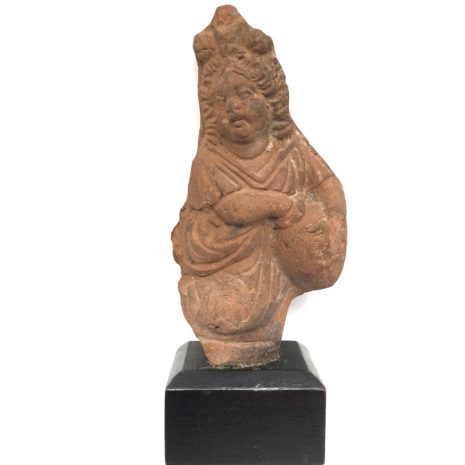Ancient Harpocrates Figurine, Roman Empire, Alexandria (1844BHK) $395
$395.00
Ht: 6.5” W: 2.625” D: 1.75” | FREE SHIPPING WITHIN CONTINENTAL U.S.!
This ancient figurine is Harpocrates the Greek god of silence and secrets holding a jar made for a home shrine. He probably represents a royal and temple cult, as he wears a double crown symbolizing both Upper and Lower Egypt and his royal emblem signifies his association with the reigning Egyptian king, who was considered a manifestation of the Egyptian god Horus. Missing part of his right side when excavated, and no with no repairs this is a true slice of history. It pairs well with #1845 Ancient Pottery Figurine of Child Nurturer Goddess.
Description
Artisans in the Roman Empire created varying local styles of terracotta figurines of gods and goddesses for placement on home shrines. This figure holding a jar represents Haroprates the ancient Greek god of silence and secrets. He may be an image of a royal and temple cult since he wears a double crown that symbolized both Upper and Lower Egypt. His royal emblem signifies his association with the reigning Egyptian king, who was considered a manifestation of the Egyptian god Horus. Most small terracotta figurines were hollow bi-valve mold-made objects. After firing the two molded pieces were luted and covered with white or beige slip, and when the slip was dry, was painted bright colors. Since they were applied after firing, pigments rarely survived burial except in small and faded patches, as with this figurine with only small white specks remaining. He is missing part of his right side, probably how it was excavated, but has no repairs or restorations and is mounted on a polished wood stand. Given its age it is in good condition with expected scrapes and surface cracks.
Sources
Maya B. Muratov, Timeline of Art History, Greek Terracotta Figurines with Articulated Limbs, The Metropolitan Museum of Art, metmuseum.org
Additional information
| Weight | 5 lbs |
|---|---|
| Dimensions | 8 × 8 × 8 in |
| Place of Origin | Ancient Mediterranean |
| Period | Ancient, Roman Empire |
| Date | 1st Century B.C.E. |
| Materials and Technique | Terracotta |
| Dimensions (inches) | Ht: 6.5” W: 2.625” D: 1.75” |
| Dimensions (metric) | Ht: 16.51cm W: 6.67cm D: 4.45cm |
| Condition | Good condition, see description |
| Item Number | 1844BHK |
| Weight | 7.8oz |
| Shipping Box Size | |
| Width | 0” to 5.9” |










